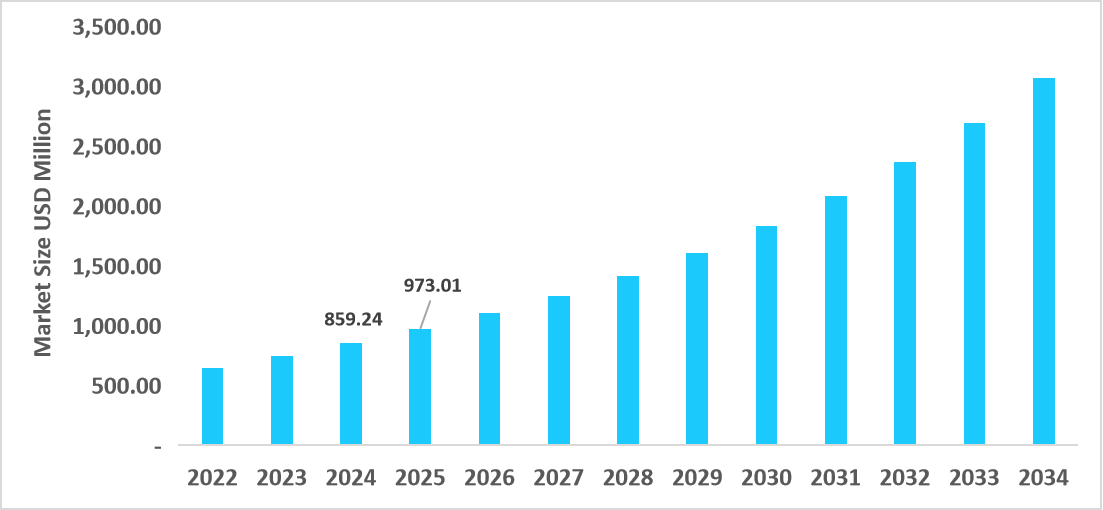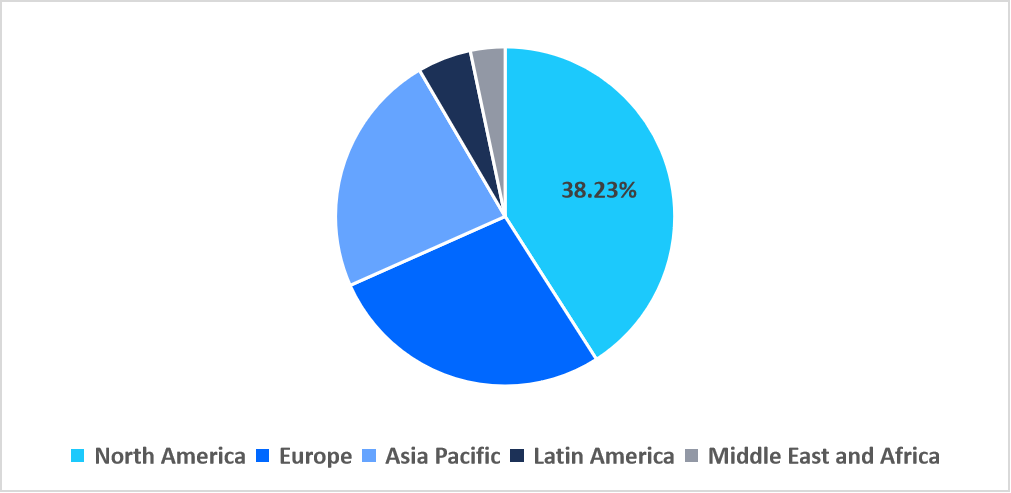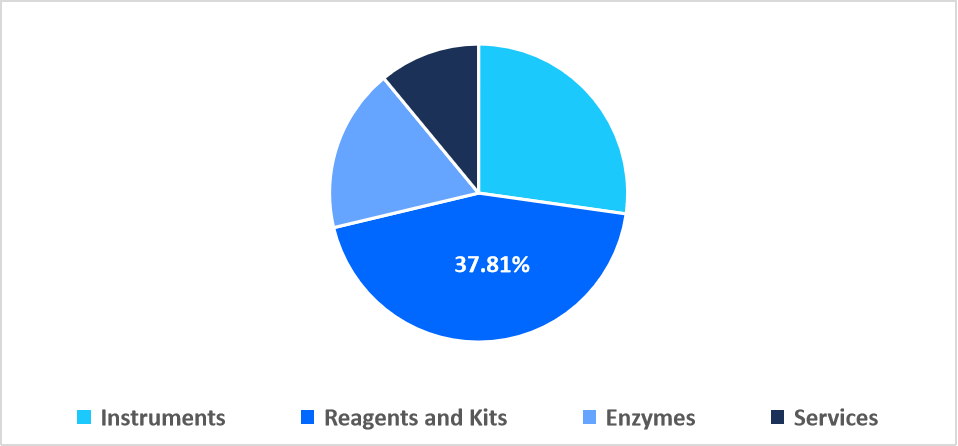Epigenetics Market Size, Share & Trends Analysis Report By Product (Instruments, Reagents and Kits, Enzymes, Services), By Technology (DNA Methylation, Histone Methylation, Histone Acetylation, Large non-coding RNA, MicroRNA modification, Others), By Application (Oncology, Autoimmune Diseases, Metabolic Diseases, Cardiovascular Diseases, Others), By End User (Academic Research, Clinical Research, Hospitals & Clinics, Pharmaceutical & Biotechnology Companies) and By Region (North America, Europe, APAC, Middle East and Africa, LATAM) Forecasts, 2026-2034
Epigenetics Market Overview
The global epigenetics market size is valued at USD 2.73 billion in 2025 and is estimated to reach USD 8.61 billion by 2034, growing at a CAGR of 13.67% during the forecast period. The market growth is attributed to the rising adoption of single-cell epigenetic analysis for precise, cell-specific disease research.
Key Market Trends & Insights
- North America held a dominant share of the global market, accounting for 38.23% share in 2025.
- The Asia Pacific region is growing at the fastest pace, with a CAGR of 15.14%.
- Based on product, the reagents and kits segment held the highest market share of 37.81% in 2025.
- On the basis of technology, the histone acetylation segment is estimated to register the fastest CAGR growth of 14.35%.
- Based on the application, the oncology segment dominated the market in 2025 with a revenue share of 36.53%
- By end user, the clinical research segment is expected to register the fastest CAGR growth during the forecast period.
- The U.S. dominates the market, valued at USD 859.24 million in 2024 and reaching USD 973.01 million in 2025.
Table: U.S. Epigenetics Market Size (USD Million)

Source: Straits Research
The global epigenetics market comprises a wide range of products, technologies, applications, and end users that collectively drive research and clinical advancements. Product offerings include instruments, reagents and kits, antibodies, ChIP-seq kits, bisulfite conversion kits, whole genome amplification kits, RNA sequencing kits, enzymes, services, and other specialized tools. Technological platforms span DNA methylation, histone methylation, histone acetylation, large non-coding RNA, microRNA modification, and additional emerging epigenetic methodologies. Key applications cover oncology, autoimmune diseases, metabolic disorders, cardiovascular diseases, and other therapeutic areas. These solutions are utilized by diverse end users, including academic research institutions, clinical research organizations, hospitals and clinics, as well as pharmaceutical and biotechnology companies.
Market Size & Forecast
- 2025 Market Size: USD 2.73 billion
- 2034 Projected Market Size: USD 8.61 billion
- CAGR (2026-2034): 13.67%
- Dominating Region: North America
- Fastest-Growing Region: Asia Pacific
Latest Market Trends
Growing Adoption of EM-seq v2 for Sensitive Methylation Detection
Epigenetic analysis is shifting from conventional to advanced enzyme-based methylation detection technologies that enable highly precise and comprehensive profiling of DNA methylation patterns. Traditionally, researchers have faced limitations with bisulfite conversion-based techniques that require large sample inputs, lead to DNA degradation, and compromise detection accuracy. Today, methylation detection kits leverage enzymatic conversion approaches to enhance sensitivity, preserve DNA integrity, and allow detection of both 5-methylcytosine and 5-hydroxymethylcytosine with minimal sample requirements. Such innovations are driving a shift in the epigenetics market toward more efficient, sensitive, and scalable DNA methylation analysis solutions.
Expansion of Epigenetics in Rare and Chronic Diseases
The expansion of epigenetic therapies beyond oncology represents a key trend in the global market. In recent years, a growing number of clinical programs have explored their therapeutic potential in non-oncological indications such as neurological, inflammatory, and rare genetic disorders. For example, Epicrispr Biotechnologies received U.S. FDA clearance for EPI-321, an investigational therapy for facioscapulohumeral muscular dystrophy, a rare neuromuscular disease, marking a significant milestone in the diversification of epigenetic applications.
This growing clinical development pipeline underscores a strategic shift, as manufacturers increasingly invest in broadening the therapeutic scope of epigenetic drugs beyond cancer.
Market Summary
| Market Metric | Details & Data (2025-2034) |
|---|---|
| 2025 Market Valuation | USD 2.73 Billion |
| Estimated 2026 Value | USD 3.06 Billion |
| Projected 2034 Value | USD 8.61 Billion |
| CAGR (2026-2034) | 13.67% |
| Dominant Region | North America |
| Fastest Growing Region | Asia-Pacific |
| Key Market Players | Thermo Fisher Scientific, Inc., Element Biosciences, Inc., Dovetail Genomics LLC., Illumina, Inc., Promega Corporation. |

to learn more about this report Download Free Sample Report
Epigenetics Market Drivers
Increasing Investments in Epigenetics Research and Diagnostics
The growing investment in epigenetics research is driving the development of innovative therapies and diagnostics. To support this growth, in September 2025, Epigenic Therapeutics completed a USD 60 million Series B funding round aimed at advancing the clinical development of its lead epigenetic therapies.
These funding initiatives highlight the increasing strategic focus on epigenetic innovations. As a result, companies are expanding research capabilities and accelerating the development of advanced epigenetic tools and therapies, thereby propelling the overall growth of the epigenetics market.
Market Restraints
Regulatory Challenges and Complex Approval Processes
The strict regulatory requirement for epigenetics is a key restraint for market growth. Therapies such as EPI‑321 by Epicrispr Biotechnologies, cleared for investigational new drug application in early 2025, have undergone multiple regulatory guidelines, which delayed its commercialization in the market. Thus, a complex approval process increases development timelines and costs, which limits the entry of new products in the market.
Market Opportunity
Advancements in High-Sensitivity Epigenetic Diagnostic Tools
The development of highly sensitive and non-invasive epigenetic diagnostic tools has increased their adoption in clinical and research areas. For example, in October 2023, EpiMedTech Global launched epiGeneComplete, a clinical test that combines DNA methylation profiling with SNP analysis from saliva for assessing metabolic and stress health markers.
Thus, the launch of such advanced diagnostic tests enables early detection and personalized monitoring of diseases.
Regional Analysis
North America dominated the epigenetics market in 2025, accounting for 38.23% market share. This dominance is attributed to the strong presence of advanced genomic infrastructure and large scale biobanks supporting epigenetic research, along with increasing government-supported initiatives promoting precision medicine programs that integrate epigenetic profiling for early disease detection and personalized therapeutic interventions across healthcare systems.
The U.S market growth is driven by the NIH’s Epigenomics Program, which funds large-scale studies to map epigenetic changes linked to cancer, diabetes, and neurological disorders. According to NIH updates, approximately USD 250 million has been allocated to advance technologies such as DNA methylation profiling and histone modification mapping. This support expands the market by increasing commercial adoption of epigenetic tools.
Asia Pacific Market Insights
Asia Pacific is emerging as the fastest-growing region with a CAGR of 15.14% from 2026 to 2034. The market growth is supported by the rapid expansion of regional biotechnology clusters and increasing government funding for genomic innovation. Furthermore, growing academic industry collaborations are accelerating the development of advanced epigenetic tools tailored for specific disease research and precision medicine initiatives across emerging economies.
The Indian market is experiencing rapid market growth due to the Indian Council of Medical Research (ICMR)’s Cancer Genomics Program, which emphasizes the role of epigenetic biomarkers in understanding cancer progression. This initiative funds large-scale studies on DNA methylation and chromatin remodeling in Indian populations, addressing region specific genetic diversity.
Regional Market share (%) in 2025

Source: Straits Research
Europe Market Insights
Europe's epigenetics market growth is augmented by the rising establishment of specialized epigenetic contract research organizations, offering end-to-end analytical services, and the increasing focus on sustainable biomanufacturing practices that utilize epigenetic optimization to enhance cell line stability and productivity in biopharmaceutical production, fostering innovation across research and industrial biotechnology applications.
The German market is recording strong market growth due to the German Cancer Research Center (DKFZ)’s epigenome mapping initiatives, which focus on decoding epigenetic changes in tumor development. DKFZ launched dedicated projects to analyze histone modifications and non-coding RNAs in cancers common in Europe, creating valuable clinical data for new drug targets. These initiatives uniquely position Germany as a leader in applied epigenetics research.
Latin America Market Insights
Latin America epigenetics market is growing at a steady pace due to the increasing establishment of regional genomics and molecular biology research centers focusing on epigenetic disease mechanisms, and the rising participation of local institutions in international clinical trials exploring epigenetic therapies.
Brazil's market growth is supported by the growing investment of private healthcare institutions in integrating epigenetic testing within preventive health programs. This trend is fueled by increasing awareness of lifestyle-related epigenetic changes and the adoption of personalized wellness screening services that utilize methylation-based biomarkers for early disease risk assessment and health optimization.
Middle East and Africa Market Insights
The Middle East and Africa epigenetics market is growing due to the rising focus on utilizing epigenetic profiling to study region-specific diseases influenced by environmental and lifestyle factors, such as diabetes and cardiovascular disorders. Moreover, emerging government-backed healthcare digitization initiatives are supporting data integration platforms that facilitate large-scale population-based epigenetic research and clinical applications.
Saudi Arabia market growth is driven by the rising adoption of epigenetic-based prenatal and maternal health screening programs. These initiatives leverage DNA methylation and histone modification analysis to assess fetal development and maternal health risks, supporting early intervention strategies and improving outcomes in reproductive healthcare.
Product Insights
The reagents and kits segment dominated the market with a revenue share of 37.81% in 2025. This growth is driven by the rising adoption of automated and high-throughput platforms that streamline epigenetic workflows, along with the increasing demand for customizable assay kits designed for multiomics integration, enabling researchers to conduct precise and large-scale epigenetic analyses efficiently.
The services segment is projected to grow at the fastest CAGR of 14.71%, owing to the increasing outsourcing of complex epigenetic data analysis to specialized service providers and the rising demand for bioinformatics-driven interpretation services that support large-scale genomic and methylation studies across pharmaceutical and academic research sectors.
By Product Market Share (%), 2025

Source: Straits Research
Technology Insights
The histone acetylation segment dominated the market in 2025 with a revenue share of 27.84%. This growth is supported by the crucial role of histone acetylation in regulating gene expression and chromatin remodeling, as it controls DNA attachment around histone proteins, which enables transcription, cellular differentiation, and response to various biological signals.
The DNA methylation segment is projected to grow at the fastest pace with a CAGR of 14.35%. This growth is stimulated by the increasing use of methylation biomarkers for liquid biopsy based cancer detection and the growing integration of AI algorithms for precise interpretation of methylation patterns in clinical diagnostics and research.
Application Insights
The oncology segment dominated the market in 2025, accounting for 36.53% market share, due to the increasing use of epigenetic biomarkers for early tumor detection and prognosis, along with the growing adoption of combination therapies that integrate epigenetic drugs with immune oncology treatments to enhance therapeutic outcomes.
The autoimmune disease segment is expected to grow at the fastest CAGR, owing to the increasing research on epigenetic regulation of immune cell differentiation and the development of epigenetic-based therapies targeting abnormal DNA methylation and histone modification patterns that contribute to autoimmune conditions such as lupus and rheumatoid arthritis.
End User Insights
The clinical research segment is expected to register the fastest CAGR of 14.97% during the forecast period. This growth is supported by the increasing inclusion of epigenetic endpoints in clinical trials and the rising collaborations between academic institutions and pharmaceutical companies to validate novel epigenetic biomarkers for therapeutic development.
Competitive Landscape
The global epigenetics market is moderately consolidated, with fewer players accounting for a major share of the market. The major key players in the market are Illumina Inc., Thermo Fisher Scientific Inc., Merck KGaA, F. Hoffmann-La Roche Ltd., QIAGEN N.V., Bio-Rad Laboratories, Inc., and others. These players are focusing on diverse strategies, including launching innovative products, forming strategic partnerships, pursuing acquisitions, and implementing technological advancements, to strengthen their market presence.
RemeGen: An emerging market player
New England Biolabs (NEB) is a global biotechnology company specializing in the development of innovative reagents and tools for molecular biology and epigenetic research. The company is actively engaged in developing advanced epigenetic kits and sequencing technologies to support research and clinical applications.
- In January 2025, NEB launched EM-seq v2, an updated kit for more sensitive detection of 5-methylcytosine (5mC) and 5-hydroxymethylcytosine (5hmC), enabling accurate DNA methylation analysis.
List of Key and Emerging Players in Epigenetics Market
- Thermo Fisher Scientific, Inc.
- Element Biosciences, Inc.
- Dovetail Genomics LLC.
- Illumina, Inc.
- Promega Corporation.
- Abcam plc.
- PacBio
- Danaher
- Bio-Rad Laboratories Inc.
- Revvity
- New England Biolabs
- Hoffmann-La Roche Ltd.
- Zymo Research Corporation
- Active Motif, Inc.
- Hologic Diagenode
- QIAGEN N.V.
- Eisai Co., Ltd.
- Epigene Labs
- Epigenica
- Others
Strategic Initiatives
- October 2025: PacBio announced innovations to its Revio and Vega platforms designed to lower sequencing costs, add new multiomic capabilities, and expand support for regulated research environments.
- July 2025:Thermo Fisher Scientific received the U.S. FDA clearance for its Oncomine Dx Express Test for patients with EGFR exon 20 insertion non-small cell lung cancer.
- May 2025: Prizer and Thermo Fisher Scientific entered into a partnership to expand localized access to next-generation sequencing-based testing for cancer patients.
Report Scope
| Report Metric | Details |
|---|---|
| Market Size in 2025 | USD 2.73 Billion |
| Market Size in 2026 | USD 3.06 Billion |
| Market Size in 2034 | USD 8.61 Billion |
| CAGR | 13.67% (2026-2034) |
| Base Year for Estimation | 2025 |
| Historical Data | 2022-2024 |
| Forecast Period | 2026-2034 |
| Report Coverage | Revenue Forecast, Competitive Landscape, Growth Factors, Environment & Regulatory Landscape and Trends |
| Segments Covered | By Product, By Technology, By Application, By End User |
| Geographies Covered | North America, Europe, APAC, Middle East and Africa, LATAM |
| Countries Covered | US, Canada, UK, Germany, France, Spain, Italy, Russia, Nordic, Benelux, China, Korea, Japan, India, Australia, Singapore, Taiwan, South East Asia, UAE, Turkey, Saudi Arabia, South Africa, Egypt, Nigeria, Brazil, Mexico, Argentina, Chile, Colombia |
to learn more about this report Download Free Sample Report
Epigenetics Market Segments
By Product
- Instruments
-
Reagents and Kits
- Antibodies
- ChiP-seq Kits
- Bisulfite Conversion Kits
- Whole Genome Amplification Kits
- RNA Sequencing Kits
- Others
- Enzymes
- Services
By Technology
- DNA Methylation
- Histone Methylation
- Histone Acetylation
- Large non-coding RNA
- MicroRNA modification
- Others
By Application
- Oncology
- Autoimmune Diseases
- Metabolic Diseases
- Cardiovascular Diseases
- Others
By End User
- Academic Research
- Clinical Research
- Hospitals & Clinics
- Pharmaceutical & Biotechnology Companies
By Region
- North America
- Europe
- APAC
- Middle East and Africa
- LATAM
Frequently Asked Questions (FAQs)
Debashree Bora
Healthcare Lead
Debashree Bora is a Healthcare Lead with over 7 years of industry experience, specializing in Healthcare IT. She provides comprehensive market insights on digital health, electronic medical records, telehealth, and healthcare analytics. Debashree’s research supports organizations in adopting technology-driven healthcare solutions, improving patient care, and achieving operational efficiency in a rapidly transforming healthcare ecosystem.










































